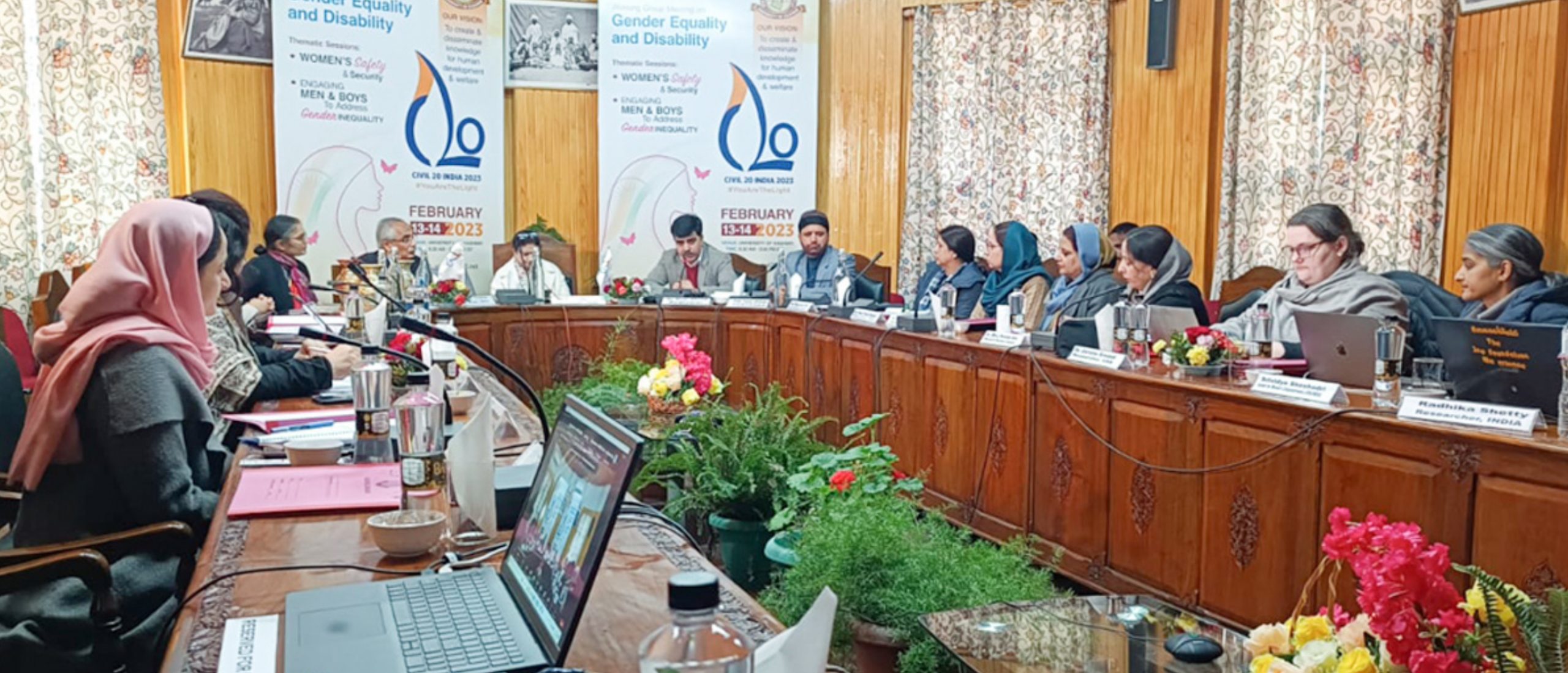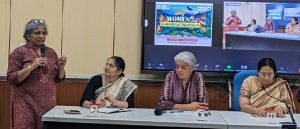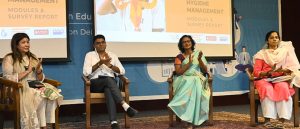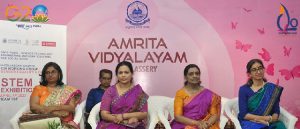The event focused on the actions citizens must take to address safety and security for women and girls and how to include men and boys in the process.
Civil 20’s Gender Equality & Disability Working Group (GED) held a two-day Policy Dialogue in Srinagar on Feb. 13 – 14, 2023 to address the sub-themes of Women’s Safety & Security and Engaging Men & Boys to address gender equality. The historic event, hosted by the University of Kashmir, marked the first collaboration with Amrita Vishwa Vidyapeetham.
It was also the GED’s first hybrid meeting conducted in-person and through webinar with 90 participants representing eight countries—Argentina, Australia, Bangladesh, Brazil, Canada, India, Italy, and the United States. Indian Co-Coordinators of GED, Dr. Bhavani Rao and Nidhi Goyal, presided over the event.
Guests of honour included Prof. Nilofar Khan, the Vice Chancellor of the University of Kashmir; Vijay K. Nambiar, UN Ambassador and Sherpa of C20 India; Prof. Nisar Ahmad Mir, the Registrar of the University of Kashmir; Shombi Sharp, the UN Resident Coordinator for India; Kanta Singh, Deputy Country Representative of UN Women in India; Huma Masood, Senior Gender Specialist at UNESCO; Nayana Sahasrabudhe of Bharatiya Stree Shakti; and Inspector General of the Central Reserve Police Force, Ms.Charu Sinha (IPS).
In her presidential remarks, Prof. Nilofar Khan expressed: “Both themes are close to my heart and to that of the University of Kashmir. Throughout my professional career of 38 years, I have advocated for both themes. It is truly a historic occasion for the University of Kashmir to host this two-day Civil 20 working group meeting on gender equality and disability, which provides a platform for all important stakeholders to deliberate upon the identified themes.”
“I am honoured to participate in this working group meeting on gender equality and disability with a special focus on the two themes of Safety & Security and Engaging Men & Boys,” stated Nambia in his welcome address as Sherpa of C20. He paid homage to the University of Kashmir for graciously hosting the program.
“As Chair of the C20, Her Holiness Mata Amritanandayami Devi, or Amma, exemplifies a vision of Civil Society where the individual and the family as well as society, markets, and the state work not in competition or conflict, but rather to supplement each other in pursuit of overall harmony.”
He also set the context of the event within the larger G20 efforts, saying: “The theme of India’s Presidency, the world is one family—vasudeva kutumbakam, calls on each one of us to move away from our narrow concerns of this is mine and this is yours, to embrace the wider perspective that celebrates the bounties of nature in a spirit of unity, respect, and compassion.
“Acceptance of the world as a family must imply a readiness to accept basic gender equality without compromising on diversity…. Your work today must include a deeper exploration of how men can be strategically engaged in gender inclusion in policy and practice with the understanding that shifting traditional gender norms will require collaboration from everyone in society. Men and boys must be willing to concede that their rights apply equally to their mothers, sisters, and daughters.”
In setting the context, Dr. Rao said: “This dialogue will abstract the key issues discussed and take them to a global level. A lot of the issues were very local and India-centric. While this is a conversation that India is leading, this is a conversation that belongs to the world. So, it will be important to abstract from the local to the global context.”
Dr. Rao emphasised that the objective of the Gender Equality & Disability Working Group is to ensure that civil society considerations related to gender and disability are taken into account in G20 discussions, translated into the G20 Leaders’ Declaration as policies and commitments, and are then implemented.
Several speakers spoke about the importance and timeliness of the meeting’s sub-themes. Although gender parity has long been recognised as a pressing development issue, the COVID-19 pandemic is acknowledged to have thwarted any progress gained, with spikes in domestic violence against women and girls, as well as rises in child marriage, and the systematic denial of educational opportunities.
CSO representatives brought to the table their on-the-ground experiences to identify both policy gaps and the necessary recommendations to ensure that gender equality interventions are informed by local community stakeholders and based on sound data and standards of practice. The two-day event also featured several Udaaharans (best practices) being implemented in the effort to address gender inequality through conversations with CSO representatives.
Numerous faculty members of the University of Kashmir who contributed valuable, critical perspectives and recommendations included Dr. Raja Fayaz, Dr. Humaira Azim, Dr. Aneesa Shafi, Dr. Shazia, Dr. Roshan Ara, Dr. Rabia Hamid, and Shaheel Mohammad.
Delegates representing local, Kashmir-based civil society organisations (CSOs) included Dr. Nazir Ahmad Khan of the Cancer Society, Shaiq Nazir of the Help Foundation, Rahi Riaz Ahmed of Ahsan Foundation, Dr. Bashir Lone and Ms. Insha Bashir of Voluntary Medicare Society, and Javaid Tak and Feroze Ahmad of Humanity Welfare Organization Helpline.
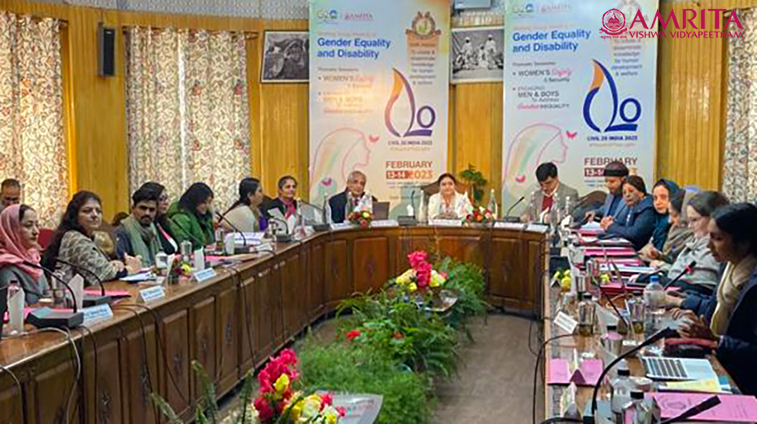
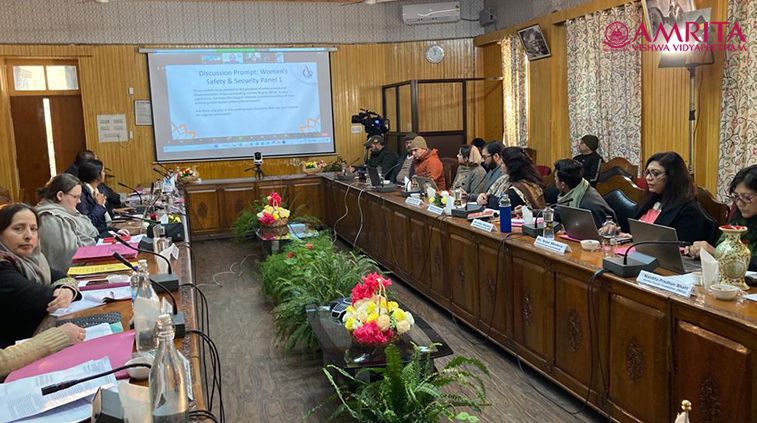
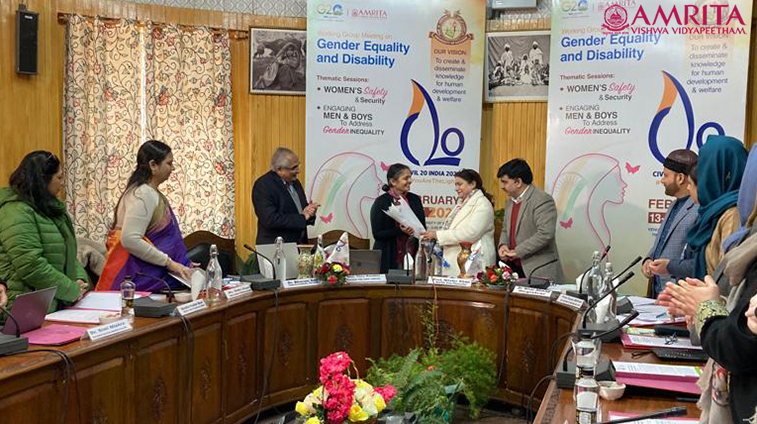
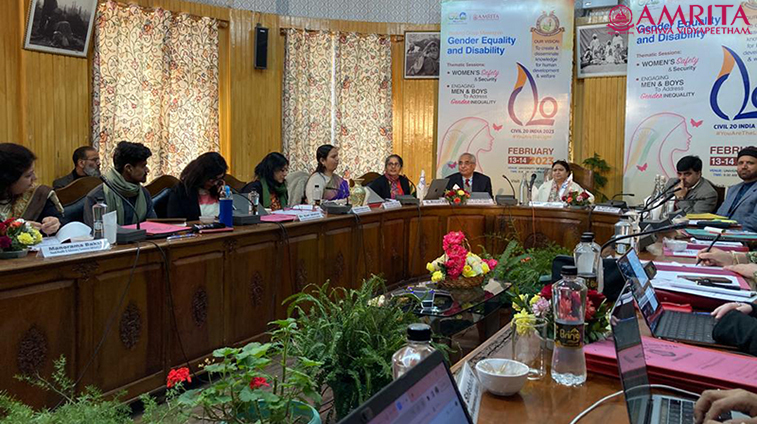
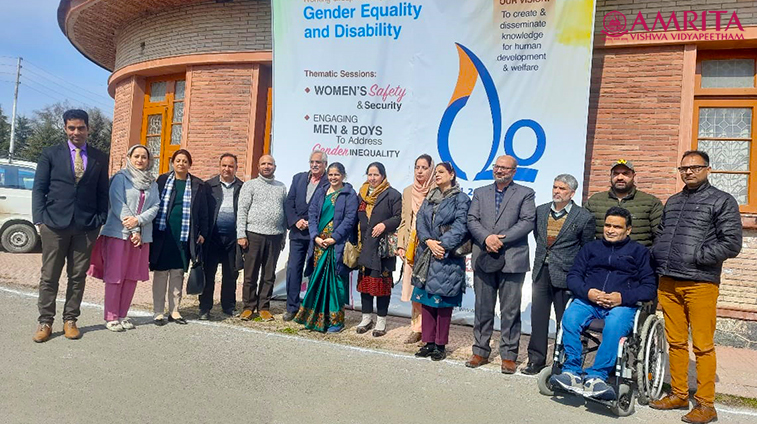
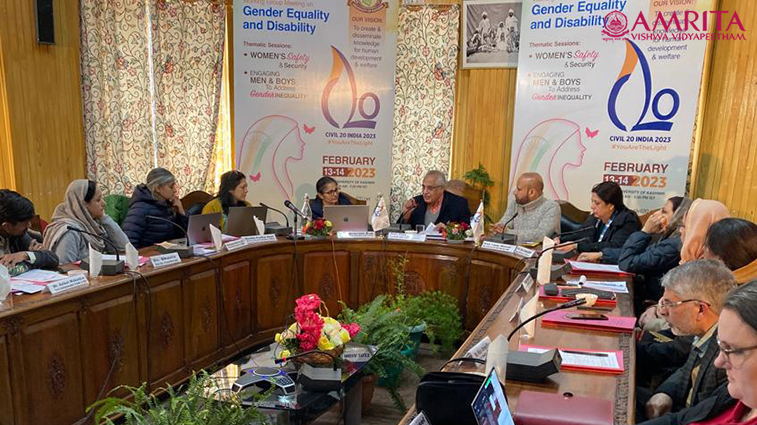
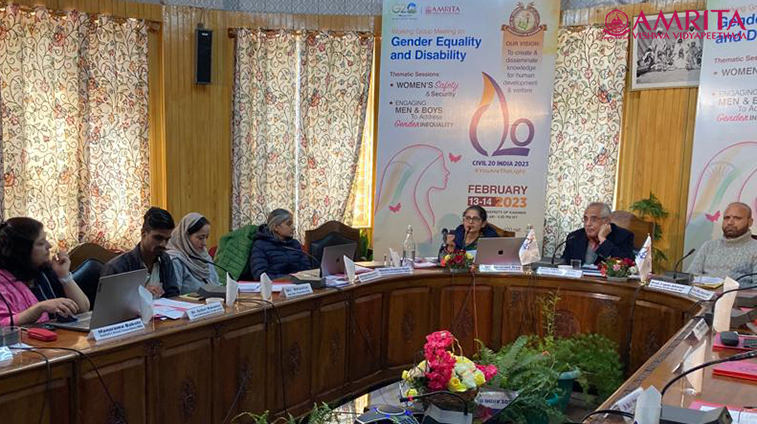
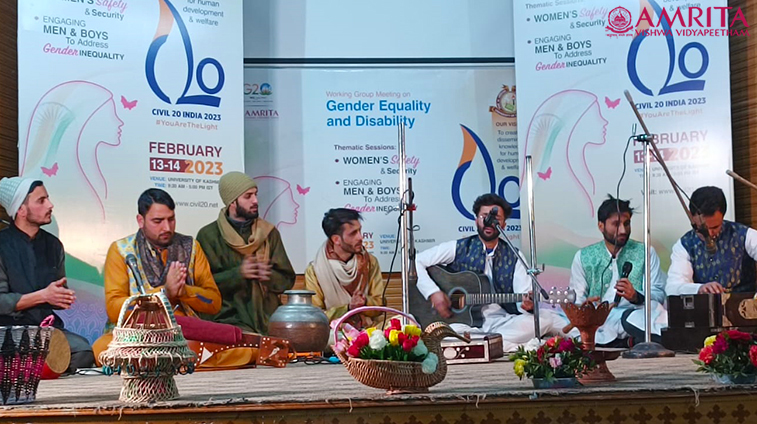
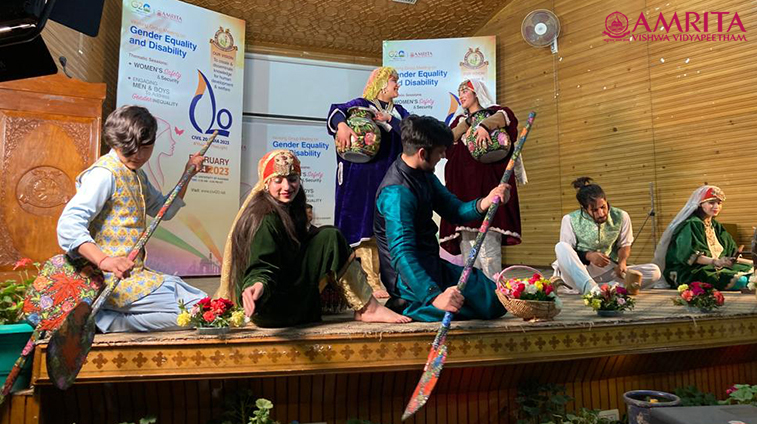
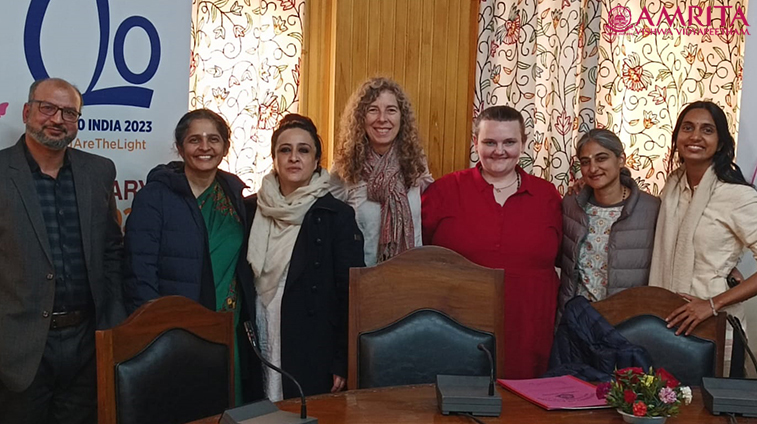
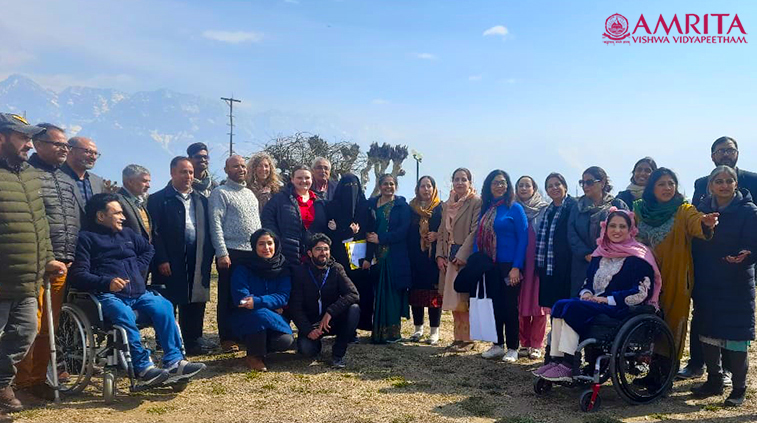
Other in-person and online panel discussants included Dr. Manorama Bakshi of Health & Advocacy at Consocia Advisory; Dr. Simi Mishra of the Connecting Dreams Foundation; Nandita Bhatt Pradhan of the Martha Farrell Foundation; Aniket Wakankar of the Gender Labs; Dr. Naila Chowdhury University of California, San Diego; Elizabeth Michaels of AIDS Healthcare Foundation; Dr. Fredrick Echols of Cure Violence Global; and Dr. Christopher Coley of Amrita.
The two-day Policy Dialogue culminated in a number of recommendations that fell under the areas of legal reforms, gender sensitisation, and public platforms:
- Interventions should target the psychological level of both stakeholders and policymakers in order for laws to translate into action. As well, to ensure that policies are enacted, and interventions are sustainable, social audits should be mandated, and incentivisation should be provided to those being trained, those providing the training, and those in leadership positions. Community involvement in all levels of creation, implementation and evaluation of interventions will also ensure sustainability.
- It is recommended that public platforms be leveraged and enhanced to promote conversations, activities, and participatory research to map and document experiences of violence and harassment with a focus on changing attitudes and taking personal responsibility.
- Given that school institutions are spaces where children and youth are socialised to societal norms, there was clear agreement on the need for mandated gender sensitisation and sexual reproductive health curricula in schools from kindergarten to higher education for students. This should include similar training for all parents, teachers, and institutional leadership.
- The recommendation to create “safe spaces” within formal and informal spaces (i.e. work environments) was made to encourage open dialogue/conversation around harassment/hostile environments, to support prevention, improved protection, facilitate/support traumatised victims to come forward, and improved redressal mechanisms among informal workers/domestic workers.
- All interventions need to be based on standard operating procedures (SOPs) that can be tailored to the specific needs of the target community. Inclusion of all genders and persons with disabilities needs to be standard in the development of these SOPs.
- Persons with disabilities must be present and drive conversations around all policies. Related to this, the vocabulary and terminology around persons with disabilities must become standardised and also determined by those living with a disability.
- The requirement for data-informed legal reforms and interventions to support improved prevention and redressal efforts, and gender-disaggregated data (including non-binary individuals) from government and non-government sources were both cited as critical to mapping out and addressing “spaces” of violence. Recommendations were made for adopting “data for good” techniques such as leveraging mass and social media to build awareness and sensitization among the community at large, and at the household level.
- The need for institutional policies and practices that promote the inclusion of men and boys was recommended in order to dismantle the burden of patriarchy by means such as identifying and promoting male role models within and outside the home (i.e. entertainment and mass media).
All in attendance appreciated the opportunity to network with other CSOs and to think deeply about the challenges and the necessary policy recommendations that need to be in place to move toward a world of gender equality and equal opportunity for a safe, happy, fulfilling life for all regardless of ability.
